Filter by

Aquaponics Food Production Systems = Combined Aquaculture and Hydroponic Prod…
This open access book, written by world experts in aquaponics and related technologies, provides the authoritative and comprehensive overview of the key aquaculture and hydroponic and other integrated systems, socio-economic and environmental aspects. Aquaponic systems, which combine aquaculture and vegetable food production offer alternative technology solutions for a world that is increasingl…
- Edition
- 1
- ISBN/ISSN
- 9783030159436
- Collation
- XVI, 619 hlm ill; lamp
- Series Title
- -
- Call Number
- -

Stakeholder Relationships And Sustainability = The Case Of Health Aid To The …
This open-access book analyses how stakeholder relationships impact the sustainability of health aid. It does this by providing an overarching analytical framework, which allows for a systematic analysis of sustainability, relationships, and a possible causal link between these phenomena. The book goes beyond universal paradigms and detailed single-case studies by offering a thorough analysis o…
- Edition
- 1
- ISBN/ISSN
- 9783031319907
- Collation
- XXV, 381 ill; lamp
- Series Title
- -
- Call Number
- -
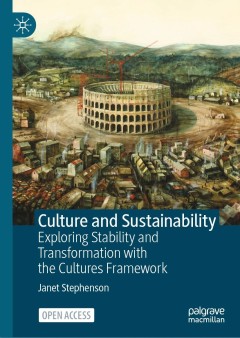
Culture and Sustainability
This Open access book brings a cultural lens, and a distinctive analytical framework, to the problem of transitioning to a sustainable, low-carbon future. The world faces a seemingly impossible hurdle – to radically alter long-established social, economic and technological systems in order to live within the biophysical limits of the globe, while ensuring a just and enduring transition. …
- Edition
- 1
- ISBN/ISSN
- 978-3-031-25515-1
- Collation
- XVII, 243
- Series Title
- -
- Call Number
- -
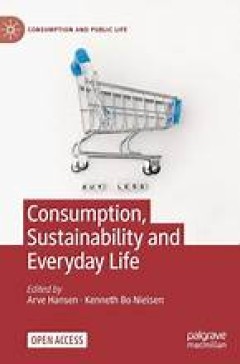
Consumption, Sustainability and Everyday Life
This open access book seeks to understand why we consume as we do, how consumption changes, and why we keep consuming more and more, despite the visible damage we are doing to the planet. The chapters cover both the stubbornness of unsustainable consumption patterns in affluent societies and the drivers of rapidly increasing consumption in emerging economies. They focus on consumption patterns …
- Edition
- 1
- ISBN/ISSN
- 978-3-031-11069-6
- Collation
- oer.unej.ac.id
- Series Title
- Consumption and Public Life
- Call Number
- 306
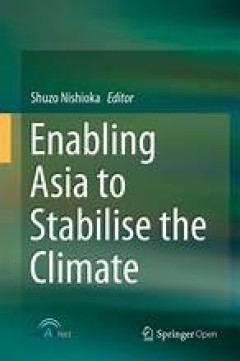
Enabling Asia to Stabilise the Climate
This book presents good practices in Asia and ASEAN countries for effectively promoting advances in response to climate change, which can help to achieve sustainable development in Asia and around the world. As a proposal, the aim is to influence the discussions at COP 21 by providing a positive agenda with concrete actions from an Asian perspective. The book is divided into three parts. Part 1…
- Edition
- 1
- ISBN/ISSN
- 978-981-287-826-7
- Collation
- -
- Series Title
- -
- Call Number
- X, 270

Towards the ethics of a green future: the theory and practice of human rights…
- Edition
- -
- ISBN/ISSN
- 9781315115788
- Collation
- -
- Series Title
- -
- Call Number
- -
- Edition
- -
- ISBN/ISSN
- 9781315115788
- Collation
- -
- Series Title
- -
- Call Number
- -

Sustainable Qatar
This open access book provides a topical overview of the key sustainability issues in Qatar, focusing on environmental sustainability from a socio-political perspective. The transition to a sustainable Qatar requires engagement with diverse areas of social-political, human, and environmental development. On the environmental aspects, the contributors address climate change, food security, water…
- Edition
- 1
- ISBN/ISSN
- 978-981-19-7398-7
- Collation
- -
- Series Title
- Gulf Studies
- Call Number
- XIII, 380

Tourism and Conservation-based Development in the Periphery
This open access book applies a social ecological systems (SES) lens to conservation-based development in Patagonia, bringing together authors with historical, contemporary, and future-oriented perspectives in order to increase understanding of the social and environmental implications of nature-based tourism and other forms of conservation-based territorial development. By focusing on Patagoni…
- Edition
- -
- ISBN/ISSN
- 978-3-031-38047-1
- Collation
- XXXIV, 468
- Series Title
- -
- Call Number
- -
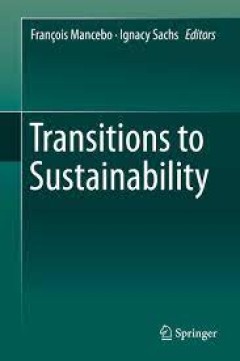
Transitions to Sustainability
This book calls for the conditions of transition to sustainability: How to take into consideration new global phenomena such as and of the dimension of climate change, the depletion of natural resources, financial crises, demographic dynamics, global urbanization, migrations and mobility, while bearing in mind short-term or local place-based issues, such as social justice or quality of life? Me…
- Edition
- -
- ISBN/ISSN
- 978-94-017-9532-6
- Collation
- -
- Series Title
- -
- Call Number
- -
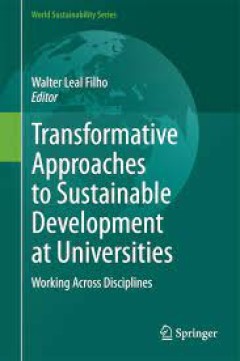
Transformative Approaches to Sustainable Development at Universities Working…
This book documents and disseminates experiences from a wide range of universities, across the five continents, which showcase how the principles of sustainable development may be incorporated as part of university programmes, and present transformatory projects and programmes, showing how sustainability can be implemented across disciplines. Sustainability in a higher education context is a fa…
- Edition
- -
- ISBN/ISSN
- 978-3-319-08837-2
- Collation
- -
- Series Title
- -
- Call Number
- -
 Computer Science, Information & General Works
Computer Science, Information & General Works  Philosophy & Psychology
Philosophy & Psychology  Religion
Religion  Social Sciences
Social Sciences  Language
Language  Pure Science
Pure Science  Applied Sciences
Applied Sciences  Art & Recreation
Art & Recreation  Literature
Literature  History & Geography
History & Geography